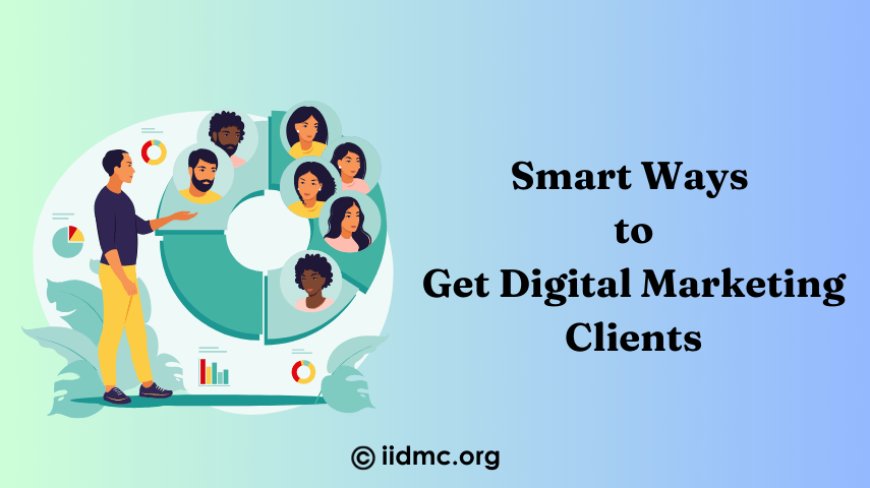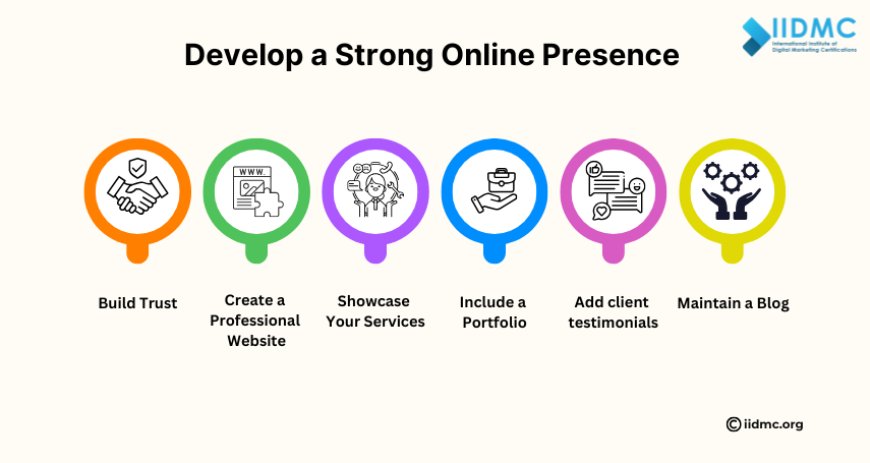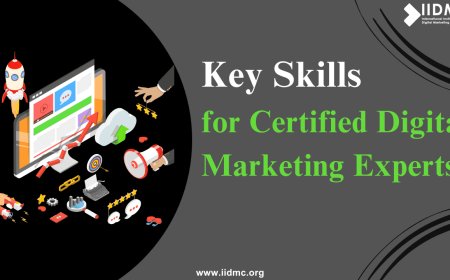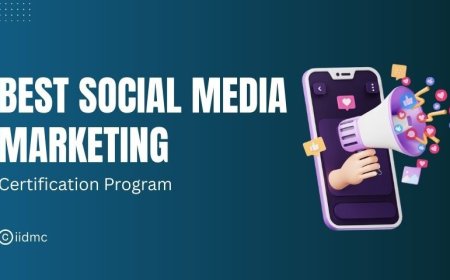Smart Ways to Get Digital Marketing Clients
Discover smart strategies to attract and retain digital marketing clients. Learn effective techniques for networking, showcasing your expertise, and leveraging online platforms to grow your client base.

With my experience in digital marketing, I understand how important it is to use online channels to promote products and services effectively. Digital marketing involves various platforms, such as websites, social media, search engines, and email, which are all crucial for reaching today’s online consumers.
I've worked in key areas like social media marketing for strategic engagement and ads, SEO (search engine optimization) and SEM (search engine marketing) to improve online visibility, and content marketing to keep audiences interested. I also use influencer marketing and data-driven approaches to target specific groups and improve campaign performance.
The real strength of digital marketing is its cost-effectiveness and the ability to track and measure results. By analyzing data, I can make changes on the go to improve strategies. Combining digital methods with traditional marketing, like print and TV ads, creates a well-rounded approach. As more consumers move online, having a smart digital marketing plan is essential for increasing brand awareness, engaging with customers, and reaching sales goals.
What is digital marketing?
Digital marketing, also known as online marketing, is all about promoting brands and connecting with potential customers through the Internet and digital platforms. It goes beyond just emails and social media—it also includes web ads, text messages, and even multimedia messaging as ways to reach people and engage them.
Understand Your Target Market
Understanding your target market is a crucial step in client learning, especially given your experience in digital marketing. Start by conducting in-depth market research to pinpoint the industries, company sizes, and key decision-makers that would benefit most from your services. explore their specific needs, challenges, and the solutions they’re actively seeking. This research will provide a clear picture of who your ideal clients are and help your marketing efforts to address their pain points effectively.
Utilize your digital marketing expertise to analyze trends and gather data on your target market’s behavior and preferences. Utilize tools like Google Analytics, social media insights, and industry reports to gain a comprehensive understanding of their needs. This targeted approach ensures that your marketing strategies are aligned with the demands of your ideal clients, making your campaigns more effective and enhancing your ability to attract and retain valuable clients.
Identify Pain Points:
-
Research Common Issues: Look into common challenges your target market faces, such as low engagement on social media or poor website traffic.
-
Direct Feedback: Engage with potential clients through surveys or conversations to uncover specific pain points they experience.
Use your experience:
-
Utilize Skills: Apply your knowledge in areas like content creation, SEO, or social media management to address these pain points.
-
Showcase Success Stories: Share case studies or examples where your expertise has successfully solved similar issues for other clients.
Customize Your Pitch:
-
Tailor Messaging: Create a pitch that directly addresses the identified problems. For instance, if small businesses struggle with social media, highlight your ability to create compelling content and manage platforms effectively.
-
Offer Specific Solutions: Detail how your strategies can resolve their particular issues, such as improving social media engagement or boosting online visibility.
Show Your Solutions:
-
Detailed Proposals: Provide a clear explanation of how your strategies will work in practice and what results they can expect.
-
Visual Aids: Use charts, graphs, or examples to illustrate the impact of your solutions.
Establish Yourself as an Expert:
Highlight Credentials: Mention any certifications, past achievements, or relevant experience that demonstrates your expertise.
Develop a Strong Online Presence
Build Trust: Show that you understand their industry and needs by using industry-specific language and addressing their unique challenges.
Create a Professional Website: Your website is usually the first thing potential clients see, so make sure it looks professional and is easy to navigate.
Showcase Your Services: Display what you offer so visitors understand your experience.
Include a Portfolio: Add examples of your work to demonstrate your skills and results.
Add client testimonials: Feature feedback from satisfied clients to build credibility and trust.
Maintain a Blog: Provide valuable content related to digital marketing to engage visitors and showcase your knowledge.

Network and Build Relationships
Networking and building relationships through industry events is a powerful strategy for client acquisition. Here’s how to make the most of these opportunities:
-
Choose the Right Events:
-
Industry Relevance: Select events that are highly relevant to your target market. For example, if you specialize in digital marketing for e-commerce, attend e-commerce or digital marketing conferences.
-
Event Size and Scope: Consider both large conferences for broad networking and smaller workshops for more focused interactions.
-
Prepare for Engagement:
-
Elevator Pitch: Have a brief and strong elevator pitch ready to introduce yourself and your services effectively.
-
Business Cards: Ensure you have plenty of business cards or digital contact-sharing options.
-
Active participation:
-
Engage in Conversations: Take the initiative to start and engage in meaningful conversations with other attendees. Listen actively to understand their needs and challenges.
-
Ask Questions: Show genuine interest by asking questions about their business and challenges. This helps in identifying potential pain points and positioning your services accordingly.
-
Follow-Up:
-
Timely Follow-Up: After the event, follow up with the contacts you made. Send personalized emails referencing your conversation and suggest a meeting to discuss how you can help.
-
Maintain Connections: Keep in touch with these contacts regularly through newsletters, social media, or occasional check-ins.
-
Utilize social media:
-
Event Hashtags: Engage with event hashtags on platforms like Twitter or LinkedIn to connect with other attendees and stay updated on event highlights.
-
Share insights: post about the event and share valuable thoughts or takeaways. This positions you as a knowledgeable professional in your field.
Ask for Referrals:
-
Timing is Key: Reach out to people when they're happiest with your work—usually right after you've successfully wrapped up a project or achieved a great result. They’re more likely to be enthusiastic about helping you out.
-
Be Straightforward: Don’t be shy about asking for referrals. A simple, direct request can be very effective. You might say, “I’m glad you’re happy with the results! If you know anyone who could benefit from similar work, I’d really appreciate a referral.”
-
Make it Easy: Simplify the process for them. You could provide a brief referral form or a simple link where they can send a recommendation. Sometimes, just making it easy can make a big difference.
Utilize referrals and testimonials.
Request Testimonials:
-
Pick the Right Moment: Ask for testimonials when your clients are feeling positive about the work you’ve done. This is often after a successful project or when they’ve seen great results.
-
Guide Them Gently: Offer a bit of guidance on what to write. You might provide them with a few questions or points to consider. This can help them give a more detailed and helpful testimonial.
-
Showcase Proudly: Display these testimonials on your website, in your marketing materials, and on social media. It’s a great way to let potential clients see the positive experiences of others.
Create a Referral Program:
-
Make it structured: Design a referral program with clear steps and rewards. It doesn’t have to be complicated—just a straightforward system where clients know what to do and what they’ll get in return.
-
Highlight the Benefits: Let your clients know about the program and how they can participate. Explain the rewards they could earn and how much you appreciate their help.
Gain client relationships:
-
Tap into Their Networks: Satisfied clients can be great advocates within their own networks. Encourage them to spread the word about your services.
-
Stay in Touch: Keep in touch with past clients through newsletters or occasional updates. This way, you stay on their radar, and they’re more likely to think of you when a referral opportunity arises.
Offer Free Value:
-
Free Consultations: Offering a free consultation is a great way to attract potential clients. It gives them a chance to see what you can do without any commitment. on their part. During the consultation, share some valuable insights and show them how your experience can help solve their problems.
-
Free Audits: You can also offer a free audit of their current situation. For example, if you’re a digital marketer, you could analyze their website or social media presence and provide a few actionable recommendations. This not only showcases your skills but also gives them a taste of the benefits they can expect from working with you.
In digital marketing, certifications like IIDMC (International Institute of Digital Marketing Certification) can serve as a valuable enhancement to your established expertise. While you likely already have deep knowledge of key strategies and tools, IIDMC certification can provide formal recognition of your skills, reinforcing your credibility in a competitive market.
This certification offers seasoned professionals like you a chance to stay updated on the latest industry advancements, refine more advanced techniques, and explore new digital tools and methodologies. The combination of experience and formal certification ensures you're well-positioned to continue driving impactful results in your digital marketing efforts while also signaling your dedication to professional development to clients or employers.





























